Labor’s aspiring new leader and NSW leftwinger says he can unite both a shellshocked party and a nation divided
In 2013, when Anthony Albanese
first hoped he would become Labor leader and face off against the newly
elected Tony Abbott after a ruinous two terms in government, being the
frontman seemed an unexpected landing point for a person who had spent
much of his political life in the backroom.
Back in 2013, I referenced Albanese’s talent for furtive ubiquity, personified by his starring role in the wonderful 1996 Bob Connolly and Robin Anderson documentary, Rats in the Ranks. The New South Wales Labor leftwinger managed to put in a star turn in the documentary, being everywhere, without appearing on camera once. “I got presented with a trophy for the best non-appearance in a feature film,” Albanese notes in an interview with Guardian Australia this week. “I dunno where it is now, but I’ve still got it somewhere”.
Revisiting Albanese’s recent past is a way of giving you an important piece of information: the member for Grayndler has many skills and attributes, and one of them is the capacity to dance between the raindrops.
But Albanese, who arrived in Canberra in 1996, has been making a
transition from denizen of the backroom to frontman since the tumult of
the Rudd/Gillard era. He was in the room when Kevin Rudd
was deposed by Julia Gillard in 2010 – a coup he always argued was a
mistake. He rebounded from that trauma to help steer Gillard’s
parliamentary ship during the minority parliament that followed the
election Labor almost lost. Then he was central to the efforts to
restore Rudd to the prime ministership before the 2013 election,
becoming deputy prime minister in the process.Back in 2013, I referenced Albanese’s talent for furtive ubiquity, personified by his starring role in the wonderful 1996 Bob Connolly and Robin Anderson documentary, Rats in the Ranks. The New South Wales Labor leftwinger managed to put in a star turn in the documentary, being everywhere, without appearing on camera once. “I got presented with a trophy for the best non-appearance in a feature film,” Albanese notes in an interview with Guardian Australia this week. “I dunno where it is now, but I’ve still got it somewhere”.
Revisiting Albanese’s recent past is a way of giving you an important piece of information: the member for Grayndler has many skills and attributes, and one of them is the capacity to dance between the raindrops.
It was that period, between 2010 and 2013, when Albanese began to countenance the idea of himself as a Labor leader rather than always playing courtier, counsellor, number cruncher and fixer. “Back then, in 2013, when we were really up against it, people said I should put myself forward if we lose,” Albanese says. “It certainly wasn’t a lifetime ambition.”
The NSW leftwinger put his name forward for the Labor leadership after the Rudd defeat in 2013. He faced off against Bill Shorten in the first leadership ballot including grassroots party members, and lost.
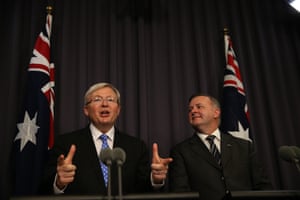
In 2019, the conditions are entirely different. The right faction this week couldn’t resolve on a preferred candidate, because senior players had already locked in behind Albanese, blocking the path of Chris Bowen, the shadow treasurer, and the next-generation option from Queensland, Jim Chalmers.
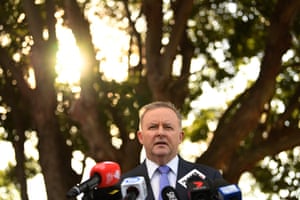
Keeping the selection away from the members potentially benefits the right faction in two ways: it avoids the unhelpful spectacle of a right candidate being crushed in a ballot, and it ensures Albanese gets the top job without a demonstrable mandate from grassroots party members – which is useful in the event the experiment doesn’t work.
There is also a view in some quarters of the right (read the NSW branch) that Albanese will track the party towards the centre. If Bill Shorten, the right faction leader, tilted the party left during his tenure as leader – and rightwingers believe he did, reflecting both the intellectual centre of gravity in the caucus, and also a persistent lack of fiscal discipline – then perhaps the leftwing Albanese, ironically, is the person to be trusted to deliver a course correction.
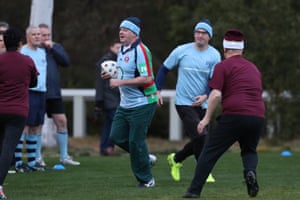
He says Labor has the next three years to work out where the current offering missed the mark, and to stitch a new platform together in time to put it before voters. “We should not be too spooked by the 24-hour media cycle to determine and respond to things quickly. The precise policies we take to the election in 2022 don’t have to be done this week.”
Albanese will want to take his time, but there is already internal positioning on that front. NSW rightwinger Tony Burke – a key Albanese backer – this week flew a kite on what Labor’s new climate policy should look like post election. That intervention caught some colleagues on the hop. Assuming that Labor locks in behind Albanese, his biggest challenge will be maintaining discipline.
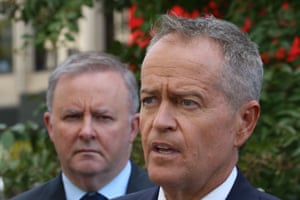
Labor thought it could count on voter respect for that long repentance project, which counterbalanced the febrile impulses of contemporary politics. But Saturday’s election loss shows voters were so unmoved by Labor’s performative contrition that they were willing to return a government that had been at war with itself for the best part of two terms. That rejection has been sufficiently scarifying to crack Labor’s concrete. Nobody is quite sure what happens next.
Albanese understands the risks that self-indulgence will again triumph, and notes the period ahead is a collective responsibility. Labor will make a choice, in other words, whether to regroup in collegial fashion or whether to become a rabble. “The caucus knows that discipline is an essential ingredient of success and we all have a collective responsibility,” he says.
"If you are a progressive and you are about change, then you have to talk to people who disagree with you."
Asked how he will command loyalty in an environment where some in Labor feel they have held their tongue over the past six years to the detriment of the party’s collective standing with voters, Albanese says by being inclusive. “If I’m successful on Monday, I think I’ve already demonstrated through how I’ve engaged with people this week that I’ll be inclusive.”
He harks back to his experience as manager of government business in Julia Gillard’s minority parliament. “I’ll work with people. I think I’ve shown a capacity to not only work with everyone on my own side but to work with the crossbenchers and the other side of politics when need be”.
“There aren’t too many people who were saying in 2010 that the parliament would serve the full term and we did it – I played a role in that, and that showed a capacity to work with people in a constructive way, even people I didn’t necessarily agree with.
“If I am successful on Monday, that will show a sense of unity from the very beginning, if I get the unanimous support of the caucus.”
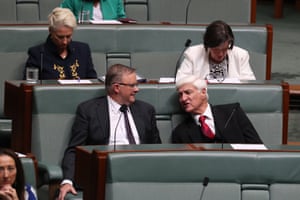
He says Scott Morrison ran a good campaign but has not revealed a plan for governing. Albanese says the Coalition is out of touch with the concerns of working Australians despite being able to court a chunk of Labor’s base in 2019. He says it remains to be determined at a granular level what went wrong with Labor’s pitch during the recent campaign, but he says Labor in the future cannot allow itself to be positioned as “not understanding that people have aspiration”.
Apart from the obvious challenges of selecting a new team and reconfiguring the policy, Albanese has some broader concerns. He goes in to this period of political leadership deeply concerned the public square is fracturing into roiling enclaves. We spoke at some length about his views on this subject late last year.
Albanese worries that progressives are losing the art of engaging with people who disagree with them, a disengagement encouraged by the culture of tribalism and confirmation bias that dominates social media platforms. He says if the desire to engage gets lost, no one’s mind gets changed and progress is imperilled.
He says it’s very easy for political leaders in the modern era to become isolated within the political complex; to assume that everyone is as engaged as the protagonists, and to conduct conversations within a bubble. Albanese says he keeps himself in circulation in communities disconnected from politics both because he wants to, because it’s part of what he needs to stay happy and healthy as a human being, but also to try and avoid an unconscious retreat into a self-reinforcing subculture.

He says his mentor and father figure, Tom Uren, a former deputy Labor leader in the 1970s, once told him his objective should be to learn something new every day, and grow as a person every day. “With me, what you see is what you get. I want to be myself,” he says.
“I think it’s very important that politicians are able to talk straight. I am who I am. I have a range of interests outside of politics; music, the arts, sport, and I’ll continue to pursue them. I don’t intend to change who I am and I think that’s what people want.
“I think if you are unclear what my values are – I’ve articulated them over a long period of time. Obviously some of them change over time as you mature and learn something new every day.
“I’m not exactly the same as I was five or 10 years ago. It would be sad if I was. That would mean I hadn’t grown.”
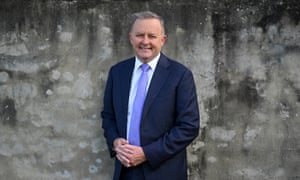
No comments:
Post a Comment